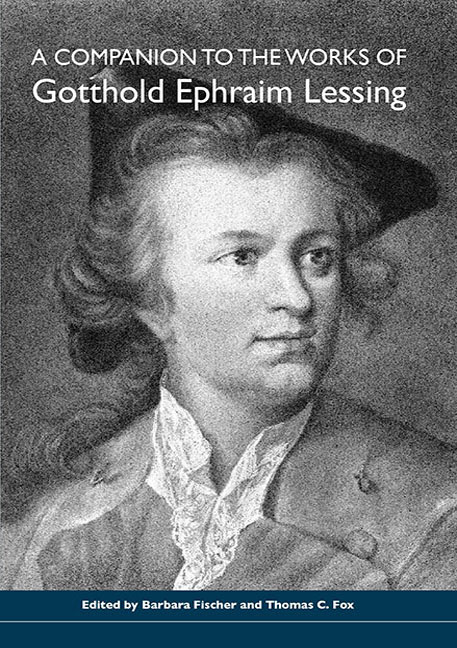Book contents
- Frontmatter
- Contents
- List of Illustrations
- Acknowledgments
- Lessing Editions and Abbreviations
- Selected Works by Lessing
- Introduction
- Lessing's Life, Work, and Times
- Criticism and Aesthetics
- Philosophy and Theology
- Drama and Drama Theory
- Reception
- Lessing and the Third Reich
- Lessing on the German-Speaking Stage in the Federal Republic of Germany, Austria, and Switzerland, 1945–1990
- Lessing on the East German Stage and Screen
- Modern Criticism in Historical Context: 200 Years of Lessing Reception
- Contact Organizations
- Works Cited
- Notes on the Contributors
- Index
Lessing on the German-Speaking Stage in the Federal Republic of Germany, Austria, and Switzerland, 1945–1990
from Reception
Published online by Cambridge University Press: 28 April 2017
- Frontmatter
- Contents
- List of Illustrations
- Acknowledgments
- Lessing Editions and Abbreviations
- Selected Works by Lessing
- Introduction
- Lessing's Life, Work, and Times
- Criticism and Aesthetics
- Philosophy and Theology
- Drama and Drama Theory
- Reception
- Lessing and the Third Reich
- Lessing on the German-Speaking Stage in the Federal Republic of Germany, Austria, and Switzerland, 1945–1990
- Lessing on the East German Stage and Screen
- Modern Criticism in Historical Context: 200 Years of Lessing Reception
- Contact Organizations
- Works Cited
- Notes on the Contributors
- Index
Summary
German Theater: A Historical Perspective
The contemporary condition of German drama and theater has been shaped by its own history. Staatsbühnen, that is, theaters financed by central or local government resources rather than by investment on the part of the directors or other participants, did not exist until the 1920s. In the seventeenth and eighteenth centuries, opera and theater were financed privately by the nobility and professional Wandertruppen. With the isolated exception of the short-lived Nationaltheater in Hamburg, private citizens did not finance culture at all, and that did not change in the nineteenth century. However, the “private theaters” of the nobility were boosted with major building projects and generous grants to such an extent that, except in Vienna, privately financed theater companies could not compete. In the nineteenth and twentieth centuries even the strongest private theaters seldom survived more than fifteen years. The temporary democratization in Germany after its defeat in the First World War placed the former court theaters under the supervision of the new republican states, which however maintained this cultural heritage without giving it any clear new direction. Buildings and their architecture, including traditional stages as well as the division of the auditorium according to social class and often with the sovereign's box directly opposite the stage, remained unaltered, as did the concept of theater being a business based on subsidies. These subsidies constituted indirect censorship.
After the First World War, theatrical innovations came from the few privately owned theaters, but these were eliminated after 1933. At that time a very large number of dramatists, script writers, and directors emigrated. These included Alfred Döblin, Lion Feuchtwanger, Bertolt Brecht, Stefan Zweig, Else Lasker-Schüler, Heinrich Mann, Klaus Mann, Ernst Toller, Therese Giehse, Fritz Kortner, Helene Weigel, Fritz Lang, Peter Lorre, Carola Neher, Erwin Piscator, Max Reinhard, Billy Wilder, and many others. After the war few of the emigrants returned. The “new beginning” of German theater either had to be managed by the elites who had cooperated with National Socialism, or the artists who had gone into “inner emigration,” supported by soldiers who had returned from the war and POW camps.
- Type
- Chapter
- Information
- A Companion to the Works of Gotthold Ephraim Lessing , pp. 283 - 300Publisher: Boydell & BrewerPrint publication year: 2005



